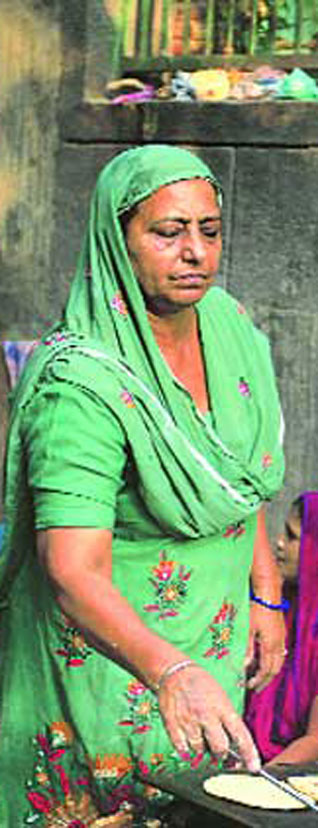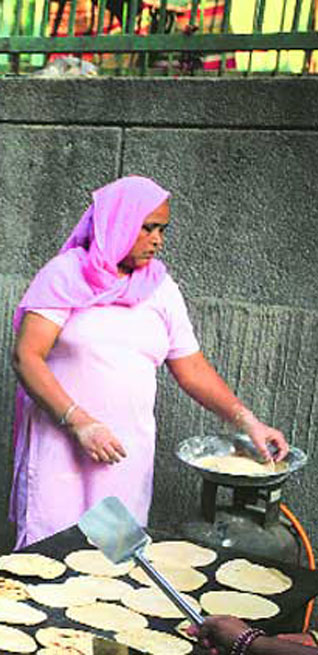1984
The Widows of 1984 Magnanimously Feed Langar To India’s Corrupt Politicians
NAVEED IQBAL
It has been 30 years, but the widows of Tilak Vihar still tear up each time they recall the horrors of the anti-Sikh pogroms that enveloped India in 1984.
Everyone in this West Delhi locality has a story of loss to share.
Outsiders to Tilak Vihar are greeted with an eight-foot banner with bloodstains painted across the digits ‘1984’. Residents have now become accustomed to politicians and media-persons visiting them on the anniversary of the mass murders.
The widows and their families greet them and repeat their pleas for justice.
For the three-day akhand paatth service, held annually for the victims of the genocide, women of the locality gathered at the gurdwara for the bhog (conclusion of the Sikh worship service).
Senior politicians were present at the prayer meeting. Residents had collected money and made arrangements for the langar -- the victims feeding those ultimately responsible for their plight!
One of the women preparing the meal was Gyaan Kaur.
“I lost everyone in my parents’ and in-laws’ house, but I feel most heartbroken over the death of my son. He was to be married a week from the massacre when they pulled him out of the house and killed him,” she said.
She said most young men in the locality grew up without knowing what it was to have a “complete family”. The government gave them houses in the widows’ colony and provided odd jobs in government offices and schools, she said.
“Very few people were educated. Even if they were, they had no proof So, we took up whatever jobs we were offered,” she said.
In front of the gurdwara, a young man, Gyaan Singh, sweeps the stairs and helps the women. Gyaan was two years old when his father, two uncles and two young brothers were killed in the pogrom.
“My mother tells me that she dressed me in my sister’s clothes to save me. I don’t recall the massacre but I remember her struggle after that,” he said, adding that his mother scrubbed floors in the city’s posh colonies to fund his education.
Gyaan points at a picture of his father, Kirpal Singh, in a room of the gurdwara that has hundreds of framed pictures of the martyrs of 1984.
“I have no memories of him, just his picture,” he said.
The pictures show men of all ages, young boys and the elderly. Some frames only show sketches of “those who either died before they managed to get a picture clicked or whose families never managed to save a picture as they ran for their lives,” Gyaan Singh said.
[Courtesy: Indian Express. Edited for sikhchic.com]
December 12, 2014
Conversation about this article
1: Kulvinder Jit Kaur (Niagara Falls, Ontario, Canada), December 13, 2014, 9:30 AM.
Do they have a choice? I reiterate, these suffering widows and their families have been abandoned by their own, i.e., the Sikhs of India. With the exception of some compassionate and caring souls like H.S. Phoolka and a handful of others, the majority of Sikhs are indifferent towards their plight. It is their shame. It is also scary to discover that your community will not reach out to you when you are in need of help. Waheguru has blessed enough Sikh-Indianss with the means of taking care of one family each. These widows don't have to stoop to feed the perpetrators and beg for justice. We should hang our head in shame that we could not save them from the wretched life that they are forced to lead. Sikh history will record this chapter too and the role of (or lack of) the affluent Sikhs of India will also be recorded. When we help each other out, we send the message that we are together in it and that message itself is unnerving for the enemy.
2: Kaala Singh (Punjab), December 13, 2014, 10:27 AM.
@1: They have not been abandoned. The survivors have received help from the Sikh community, but of course it leaves a lot to be desired. Also, a lot of government compensation remains undisbursed.
3: Gurdyal Singh (New Jersey, USA), December 13, 2014, 10:40 AM.
I'm sorry that I have to point this out, Kaala Singh ji, but why is that the efforts of India's Sikhs -- more affluent than any other community in India -- leave "a lot to be desired"? Are there more urgent priorities? [By the way, are those other so-called priorities being addressed? I doubt it.] It's indeed a shame, a dark blot on the Sikhs of India, that these victims of the 1984 Genocide have to even expect handouts from the very government apparatus which brutalized them. It's heartbreaking to see India's Sikhs behaving like -- well, like Hindus! All of India should, collectively, hang its heads in shame.
4: Kaala Singh (Punjab), December 13, 2014, 11:08 AM.
@3: Gurdyal Singh ji: You are correct, it's a shame that the survivors have not been helped enough. The Sikhs who are rich in India are rich because of their political connections and they don't care. Some are busy stealing money from the gurdwaras, nobody knows how the huge funds in the gurdwaras are being utilized. We also had a "glorified" Sikh PM for 10 years who if not anything else, could have helped the survivors rebuild their lives even if he used a small fraction of the money stolen during his "rule". Doing justice was beyond his capability, we all understand that. But the survivors were indeed helped by the common Sikhs in whatever way they could.
5: N Singh (Canada), December 13, 2014, 1:21 PM.
@1: Will history also not record that the Sikh diaspora, rich and successful in countries like Canada, US and UK, also did little to support them? Does brotherhood not cross national boundaries?
6: Harpreet Singh (California, USA), December 14, 2014, 1:02 AM.
@5. Agree 100% with you. It is a collective shame of the Sikh nation! Justice must be done and the fight must go on but what about rehabilitation? I urge everyone especially (European sangat) to contribute to a charity called Seva84. They are UK based and are actively working on rehabilitation projects in Tilak Vihar. (For some reason American credit cards are rejected by their websites. Maybe someone from UK can help remove this restriction.) If Sikhs can fund charities for disaster relief, I am sure Seva84 deserves as much funding!
7: Kulvnder Jit Kaur (Niagara Falls, Ontario, Canada), December 14, 2014, 3:00 PM.
Agreed brotherhood transcends all national boundaries but the Sikhs of the diaspora cannot trust if the funds will be utilized in the way they are meant to be. India does not have the best of reputations in matters of integrity and honesty. Not trying to point fingers but it is much easier for local Sikhs to rehabilitate these victims. When diaspora Sikhs land in India they are not familiar with the system and how to best help these families for the long term. I mean, a secure place to live in, education for the young and employment for the adults. With India doing splendidly in terms of its economy (especially Sikhs), these local rich Sikhs have all the political connections (#4)and know the ropes of survival in that country. Some of these women (widows of the 1984 genocide victims) were scrubbing floors in posh colonies to educate their children. It was very easy for some wealthy Sikhs living in posh colonies to employ these women in their homes, provide a safe place to live and pay for their children's education. Something that a local can do easily. They employ domestic servants anyway. Even employ these victims in their businesses or find them good jobs with other Sikhs. Most of these people were from the low middle class to begin with and now they are reduced to a bare existence level. Local Sikhs could have "taught them to fish" so that they are self sufficient for life. The diaspora Sikhs can help by getting them out of that country. If they have to do menial jobs, at least they will do it in a safer country and with much better prospects for the future for their children. To effect that, Sikhs in India could create an agency which could process such connections and be a conduit, but again, it would have to do it with a level of integrity and honesty which is otherwise sadly lacking in India at every level and in every sector.




